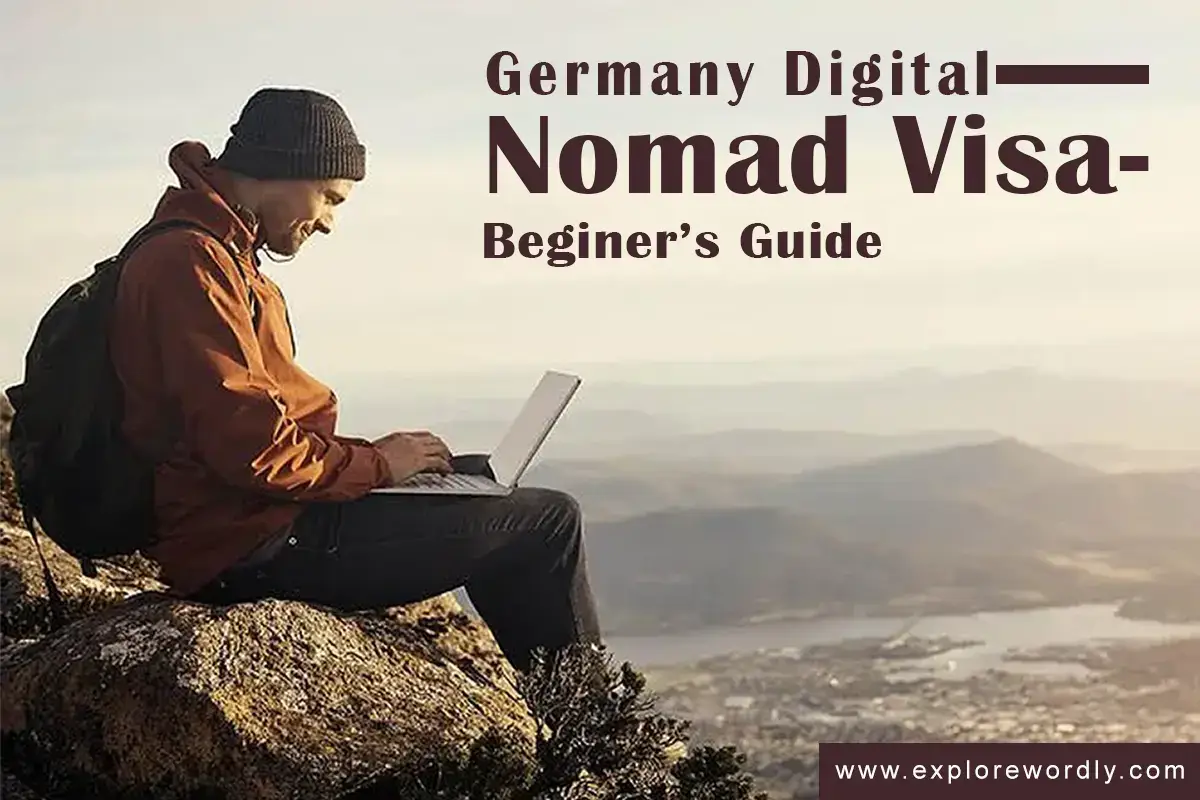Germany Digital Nomad Visa | Beginner’s Guide

A Digital nomad is an individual who utilizes telecommunications technologies to earn a living and conduct their life in a nomadic manner, often working remotely from different locations around the world.
With the rise of remote work and digital entrepreneurship, many countries have introduced digital nomad visa programs to attract skilled professionals and promote tourism.
Purpose and Benefits of Germany’s Digital Nomad Visa
- Germany’s Digital Nomad Visa aims to attract remote workers, freelancers, and entrepreneurs by providing them with a legal framework to live and work in Germany for an extended period.
- Benefits include access to Germany’s robust infrastructure, healthcare system, and vibrant cultural scene.
Understanding the Germany Digital Nomad Visa
The Germany Digital Nomad Visa allows individuals to live and work in Germany without needing a traditional work permit.
Does Germany have a digital nomad visa?
No, Germany currently does not have a dedicated digital nomad visa. However, there is a pathway for remote workers to live and work in the country through the “Freiberufler” visa, also known as the freelance visa.
What types of digital nomad visas does Germany offer?
According to the Nomad List, Germans have a strong affinity for the digital nomad lifestyle, comprising approximately 4% of all digital nomads.
As mentioned, Germany does not offer a specific digital nomad visa. However, digital nomads can apply for two different types of visas in Germany:
- The freelance visa (Freiberufler).
- The self-employment visa (Selbständiger).
Freiberufler visa:
This visa is designed for self-employed individuals and freelancers across various professions. Think developers, writers, photographers, and virtual assistants.
It allows you to live and work in Germany as a freelancer.
There are specific requirements for freelancing residence permit, including:
- Professional qualifications: Proof of relevant skills and experience in your field.
- Creative professions (painters, musicians, writers, journalists, translators, photographers, videographers, interpreters, artists, etc.)
- Medical professions (medical scientists, doctors, veterinarians, dentists, physiotherapists, psychologists, etc.)
- Financial stability: Evidence of consistent income, usually a minimum of €9,000 per year.
- Business plan: A well-defined plan outlining your freelance work in Germany.
- Health insurance: Coverage that meets German standards.
- German address: Secure accommodation and register your address locally.
Eligibility Criteria for Freelancer Visa
- You must be over 18 years old.
- Your nationality shouldn’t pose an immediate issue, but check with the German embassy or consulate in your country for specific requirements.
- You shouldn’t have any serious criminal convictions.
- You must be self-employed or a freelancer with a demonstrably independent source of income.
- You need to prove relevant skills and experience in your chosen field. This could include a university degree, professional certifications, or a strong portfolio of work.
- You’ll need a well-defined business plan outlining your freelance work in Germany. This should detail your services, target clients, income projections, and marketing strategy.
- You must demonstrate financial stability with enough income to support yourself in Germany. The minimum acceptable income varies, but it’s generally around €9,000 per year. You may need to show proof of income for the past few years.
- You need to have health insurance that meets German standards and covers you for the duration of your visa.
- While not mandatory, basic German language skills can be helpful and strengthen your application.
Rights and Limitations of Visa Holders
The Freelancer Visa offers a valuable opportunity for remote workers to live and work in Germany. Be aware of the rights and limitations associated with the visa and plan your life accordingly.
| Rights | Limitations |
|---|---|
| Work as a freelancer in Germany. | Cannot be employed by a single German company. |
| Legal residency for up to one year (with extensions). | Some professions may have additional restrictions. |
| Travel within Schengen countries for 90 days in a 180-day period. | Responsibility for registering as a freelancer and paying taxes. |
| Access to social security benefits. | Visa renewal requires proof of ongoing freelance activity and income. |
| Family reunification under certain conditions. | Permanent residency process can be complex and isn’t guaranteed. |
How to Apply for Germany Digital Nomad Visa?
- Gather the required documents. This includes your passport, photos, proof of income, client letters, CV, cover letter, professional authorization, etc.
- Schedule an appointment at your local German embassy or consulate.
- Attend your appointment and submit your application. Pay the necessary fees.
Processing Time and Fees
- Processing time varies but generally takes several weeks.
- Applicants should be prepared to pay a visa fee as part of the application process.
Skilled Immigration Act visa:
Do you want to work in Germany and have skills that are in high demand? The Skilled Immigration Act, also known as the Fachkräfteeinwanderungsgesetz, might be just what you need!
Regarding the self-employment visa, applicants must own or manage a business that is of economic interest to Germany. The business must contribute to the German economy, and applicants must have a viable business plan that clearly demonstrates this.
It’s a great opportunity for skilled professionals to live and work in Germany!
| Feature | Freelance Visa | Skilled Immigration Act Visa |
|---|---|---|
| Target audience | Freelancers and remote workers | Skilled workers in shortage occupations |
| Specific profession requirement | Yes | Depends on shortage occupation list |
| Client letters required | Yes | Not necessarily |
| Address registration required | Yes | Not necessarily |
Germany digital nomad visa – The freelance resident permit

The freelance resident permit enables individuals to legally reside and work in Germany for up to 1 year, with the option to extend it for an additional 3 years. The process for obtaining a freelance visa involves two stages:
- Obtaining the freelance entry visa or National D visa: This application is submitted to the German embassy in your country of residence. Upon approval, the visa is valid for 3 months, during which you must exchange it for the freelance residence permit.
- Obtaining the freelance residence permit: This permit allows for living and working in Germany for 1 to 3 years. Application is made at the local immigration office where residency is registered. Once the residence permit is granted, the entry visa becomes invalid and unnecessary.
Benefits of The freelance resident permit
The benefits of applying for and obtaining the freelance visa include:
- The opportunity to work and reside in Germany for a year, with the possibility of extending it for up to 3 years.
- Favorable tax treatment as a freelancer for all income earned during the visa period.
- Freedom to travel within the Schengen area without restrictions.
- The ability to work with both foreign and German clients and companies.
However, meeting several requirements is necessary to enjoy these benefits.
What is the duration of validity for the German freelance residence permit?
The freelance visa is typically issued for a duration of 1 year, with the possibility of extending it for a total of up to 3 years.
However, there is a condition: you must not spend more than 180 days outside of Germany during the visa period.
Failure to comply with this requirement will result in the visa becoming void, necessitating either reapplication or relinquishment of the opportunity to reside temporarily in Germany.
Which documents are required for the freelance residence permit?
You’ll need the same set of documents for both stages of your visa application. Ensure you have 2 or 3 copies of each, if possible or applicable:
- Valid passport (issued within the last 10 years, valid for at least 3 more months after your application, with at least 2 free pages for the visa vignette).
- Completed application form (Antrag auf Erteilung eines Aufenthaltstitels), which may vary depending on where you’re applying.
- One standard passport photo (35mm x 45mm).
- Your CV formatted similarly to those used in Germany.
- Proof of financial sustainability, including bank statements demonstrating regular income, revenue forecasts, or fee schedules, along with a bank account holding the required minimum balance and a profit and loss statement.
- Letters of intent and recommendation.
- University degree (if recently graduated) from a recognized and certified institution.
- Proof of private or public health insurance.
- Signed and notarized rental contract.
- Proof of address registration.
- Retirement plan (if aged 45 or older).
- Portfolio showcasing previous work relevant to your profession.
- Evidence of acquired diplomas, certificates, and professional authorizations demonstrating expertise in your stated profession.
Remote work in Germany as an EU citizen
As an EU citizen, you have the freedom to work remotely from Germany without needing a specific work permit. The EU’s principle of freedom of movement allows you to reside and work in any EU member state, including Germany.
However, if you’re not freelancing, it’s important to discuss the specifics of your remote work arrangement with your employer and ensure compliance with local regulations, such as contributions to health insurance.
It’s worth noting that if you spend more than 183 days in Germany during a calendar year, you’re classified as a taxable resident and are liable to pay income tax at rates ranging from 14% to 45%.
Living and Working in Germany as a Digital Nomad
Considerations for Living and Working in Germany as a Digital Nomad:
- Financial Planning: Budget for living expenses, including accommodation, health insurance, and taxes. Familiarize yourself with German tax regulations and obligations for freelancers.
- Health Insurance: Arrange for adequate health insurance coverage, either through private or public insurance schemes, as it is mandatory in Germany.
- Accommodation: Research and secure suitable accommodation arrangements, whether it’s short-term rentals, co-living spaces, or long-term leases.
- Connectivity: Ensure access to reliable internet connections, particularly if your work relies heavily on digital communication and remote collaboration.
- Cultural Integration: Familiarize yourself with German culture, customs, and language to ease social interactions and integration into local communities.
- Work-Life Balance: Maintain a healthy balance between work and leisure activities, taking advantage of Germany’s rich cultural offerings and outdoor attractions.
- Legal Compliance: Stay informed about legal requirements and regulations governing remote work and residency in Germany, including tax filings and visa renewals.
- Network and Community: Connect with other digital nomads, expatriates, and local professionals through online platforms, coworking spaces, and networking events.
- Travel Opportunities: Explore the diverse regions and neighboring countries within the Schengen area during your stay in Germany, while adhering to visa and residency restrictions.
By considering these factors, you can effectively navigate the experience of living and working as a digital nomad in Germany.
Legal and Tax Considerations
Digital nomads may be subject to taxation in Germany based on their income source and duration of stay.
Tax Residency: Once you become a tax resident in Germany (generally after spending 183 days in a year), you’ll be subject to income tax on your worldwide earnings. Progressive tax rates apply, starting at 14% and going up to 42% for those earning over €57,918 per year.
Freelance vs. Gewerbetreibende: If you work as a freelancer (Freiberufler), you may be exempt from VAT if your annual revenue is below €22,000. However, if you register as a Gewerbetreibende (business owner), you’ll be liable for VAT regardless of your income.
Double Taxation Treaties: Germany has double taxation treaties with many countries, which can help avoid paying taxes twice on the same income. Consult a tax advisor to see if your home country has a treaty with Germany.
Challenges and Tips for Success
Living and working in Germany as a digital nomad offers exciting opportunities, but it also presents unique challenges.
| Challenges | Tips for Success |
|---|---|
| Visas and bureaucracy | Research visa options |
| Reliable internet | arrange accommodation in advance |
| Cultural adaptation | Invest in travel insurance |
| Social isolation | Learn basic German |
| Work-life balance | Connect with digital nomad communities |
| Cost of living | Explore leisure activities |
| Budget meticulously | |
| Embrace flexibility | |
| Seek professional guidance |
Conclusion
Overall, the Germany Digital Nomad Visa presents a viable option for those seeking to explore new horizons while maintaining their remote work lifestyle. With careful planning and preparation, digital nomads can make the most of their experience in Germany.
As a final note, I encourage aspiring digital nomads to consider the opportunities offered by Germany’s Digital Nomad Visa and to embark on this exciting journey with confidence.
While challenges may arise, the rewards of experiencing a new culture and expanding one’s horizons are undoubtedly worth it. Germany awaits, ready to welcome digital nomads from around the world.
FAQs – Germany Digital Nomad Visa
How do I get a digital nomad visa for Germany?
To get a digital nomad visa for Germany, you’ll need to meet eligibility criteria, including having proof of sufficient funds, health insurance, and a freelance or remote work contract. Apply through the German embassy or consulate in your home country.
How to live in Germany as a digital nomad?
Living in Germany as a digital nomad involves securing accommodation, obtaining health insurance, and familiarizing yourself with local laws. Joining coworking spaces can also help establish a work routine and meet fellow nomads.
Which European country is the easiest to get a digital nomad visa?
At present, Estonia is often cited as the easiest European country to obtain a digital nomad visa. Their e-Residency program allows remote workers to establish and manage a business online, granting access to Schengen area countries.
Case Studies and Testimonials
To get a more personal perspective on the experience of living and working in Germany as a digital nomad, here are some case studies and testimonials:
Case Study 1: Sarah, a Content Creator from the UK
- Visa: Freelance Visa (Freiberufler)
- Location: Berlin
- Challenges: Learning German, finding reliable internet outside Berlin, building a local network.
- Tips: Joined co-working spaces, took German language courses and actively participated in online communities.
- Testimonial: “Berlin is the perfect mix of vibrant city life and laid-back cafes where I can work. The challenges were worth it for the cultural experiences and the freedom to explore Europe on weekends.”
Case Study 2: David, a Web Developer from Canada
- Visa: Skilled Immigration Act (Fachkräfteeinwanderungsgesetz)
- Location: Munich
- Challenges: High cost of living, adapting to German work culture, navigating complex tax regulations.
- Tips: Researched living costs beforehand, networked with other tech professionals, and consulted a tax advisor.
- Testimonial: “Munich offers great career opportunities and amazing scenery. The bureaucracy was a hassle, but the high salary and quality of life make it worth it.”
Case Study 3: Maria, a Blogger from Spain
- Visa: EU Citizen
- Location: Freiburg
- Challenges: Feeling isolated when working remotely, missing family and friends back home.
- Tips: Joined local clubs and language exchange groups, took frequent trips back home and established a strong online community.
- Testimonial: “Freiburg is a charming town with a strong sense of community. It’s been a challenge to overcome loneliness, but the slower pace of life and beautiful surroundings balance it out.”

“Germany has surprised me with its openness and welcoming attitude towards digital nomads. The infrastructure is amazing, and the food is incredible!”
John, Software Engineer
“The bureaucracy can be frustrating, but I’ve found Germans to be generally helpful and willing to offer assistance when needed.”
– Anna Wong, Volunteer
Additional Resources and References
Books for remote work for further reading
- How to Live and Work Anywhere in the World by Chris Guillebeau: A classic in the digital nomad realm, offering practical advice and inspiration for building a remote career.
- The 4-Hour Workweek by Tim Ferriss: Explores the concept of escaping the 9-to-5 grind and creating a lifestyle of freedom and travel through automation and remote work.
- How to Take Control of Your Work and Live Without Walls by Jason Fried & David Heinemeier Hansson: Focuses on building successful remote teams and creating a productive and flexible work environment.
- The Anti-Guide to Travel by Rolf Potts: Encourages a more independent and adventurous approach to travel, away from tourist traps and towards authentic experiences.
